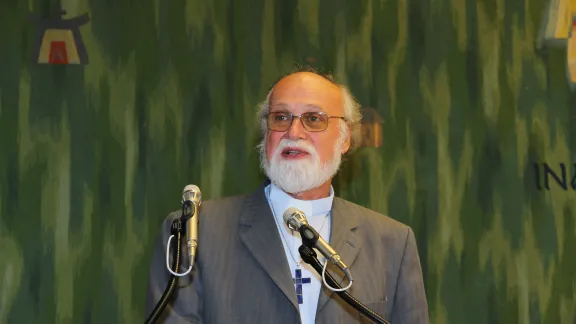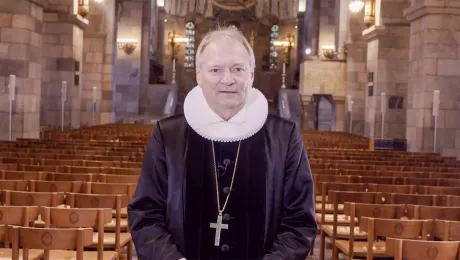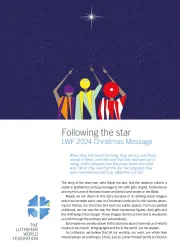
Rev. Dr. Walter Altmann reports for the Special Committee on Reformation 2017. © LWF/M. Haas
LWF presents plans and theme for the Reformation anniversary
(LWI) The Lutheran World Federation (LWF) wishes to celebrate the 500th anniversary of the Reformation in 2017 as a global communion. “There are already many activities in the member churches. The LWF’s role is to support them and offer a global perspective,” underlined Rev. Dr. Walter Altmann on 14 June 2013 during the LWF Council meeting.
Altmann was speaking as chair of the LWF’s Special Committee on “Luther 2017 – 500 years of the Reformation”, and presenting the committee’s report to the LWF Council. The report proposes values and principles for the LWF’s activities to mark the Reformation anniversary, and also includes practical details of processes that are already underway. The Council expressed its unanimous approval of the report. Accordingly, the LWF will mainly concentrate its activities on the three years from 2015 to 2017. Focal points will be the Council meeting in 2016 in Wittenberg, the Assembly in 2017, and Reformation Day in 2017.
Global, ecumenical and in ongoing reformation
The report recommended three areas of content to the Council. Activities will be guided by the principles “Reformation as a global citizen”, “Ecumenical accountability,” and “Churches of Reformation are churches in ongoing reformation.”
“Ecumenical relations are an integral component of our Lutheran identity. Not something added on,” Altmann said in his presentation. He saw 2017 as a good time to harvest the fruits and successes of the ecumenical process. For example, the Lutheran-Roman Catholic Commission on Unity would celebrate its 50th anniversary in 2017, as well.
An important question for Altmann is how the anniversary can be important for young people. The Communion Office is already working on a Global Young Reformers Network as a practical LWF project. The idea is that young people from LWF member churches use global connectivity to focus worldwide on the Reformation heritage and Lutheran identity, at the same time becoming young reformers in their churches.
“Liberated by God’s grace” as the theme
Along with the report, the Council approved the theme “Liberated by God’s grace”, which will overarch all LWF activities around the Reformation anniversary. “The theme,” Altmann noted, “offers various possibilities of reflection on such questions as, liberated by God’s grace – from what? For what?” It would enable further exploration of the Lutheran understanding of the doctrine of justification or the Luther’s concept of the “freedom of the Christian.” “Liberated by God’s grace” is also to be theme of the LWF Assembly in 2017.
Altmann explained that the theme had been divided into three more tangible sub-themes:
“Salvation – not for sale” highlights the fact that salvation is God’s free gift and cannot be bought. There is a clear critique of practices that treat salvation as a commodity on the “religious market.”
“Human beings – not for sale” underscores that every individual is a unique person created in God’s own image and his/her dignity and integrity must therefore be fully respected. Social and economic practices that violate this dignity can receive due attention here.
“Creation – not for sale” highlights that creation has only been entrusted to human beings. The sub-theme calls for a non-exploitative, sustainable approach to creation and opposes commodifying resources such as water.
Reformation anniversary as communion
In his presentation, Altmann underlined again the communion concept of the LWF: “May all member churches understand the processes and plans for the anniversary as part of their common path as a worldwide Communion.” The member churches should thus mutually inform one another of their ideas and initiatives. They should also play an active part in LWF programs: “The LWF’s task is global expression.”
“Unity in diversity” could find special expression on Reformation Day 2017, which most churches celebrate on 31 October. The Special Committee suggests holding services of worship worldwide with an LWF liturgy. True to LWF’s self-understanding, the liturgy should contain elements of catholicity and contextuality, i.e. elements that are both universal and contextualized.
Networking role of the LWF
On the basis of the report, the Communion Office in Geneva will continue with more detailed planning for the whole LWF Communion. In so doing, it will foster exchange and coordination among member churches, e.g. with a worldwide network of the persons in the member churches with responsibility for the Reformation anniversary.
On the conclusion of the presentation, LWF President Bishop Dr. Munib A. Younan thanked the members and the Chair of the Special Committee for their hard work and great commitment.


